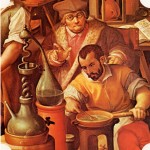 How have scientific pursuits shaped our lives and our society, and how have social practices in turn shaped these pursuits? The emergence and flourishing of the sciences have affected all aspects of our culture, and have raised pressing issues that have been explored in the history, philosophy, and literature of science. What hopes might the sciences fulfill, and what fears do they raise? Can the sciences help us to answer deep concerns about ourselves and our society, guiding us to ever-greater achievement in knowledge and power, or do they threaten to undermine our happiness and welfare?
How have scientific pursuits shaped our lives and our society, and how have social practices in turn shaped these pursuits? The emergence and flourishing of the sciences have affected all aspects of our culture, and have raised pressing issues that have been explored in the history, philosophy, and literature of science. What hopes might the sciences fulfill, and what fears do they raise? Can the sciences help us to answer deep concerns about ourselves and our society, guiding us to ever-greater achievement in knowledge and power, or do they threaten to undermine our happiness and welfare?
We will be exploring these and related questions through a range of ancient and modern texts in the history, philosophy, and literature of science. Selected texts from the sciences, and related philosophical, historical, and literary works (plays, poetry, novels and film), will help us to compare competing claims to knowledge, and to trace the changing figure of the scientist from Prometheus and Faust to the experts of the modern age.
Teaching team
- Adam Frank (English)
- Christina Hendricks (Philosophy)
- Brandon Konoval (Music)
- Alan Richardson (Philosophy)
- Jeremy Schmidt (History)
Texts
- Genesis
- Aeschylus, Prometheus Bound
- Christopher Marlowe, Doctor Faustus
- Francis Bacon, The New Organon/New Atlantis
- René Descartes, Meditations/Discourse on Method
- Thomas Hobbes, Leviathan
- Jonathan Swift, Gulliver’s Travels
- Jean-Jacques Rousseau, Discourse on Inequality
- Mary Shelley, Frankenstein
- Charles Darwin, Origin of Species
- Edgar Allan Poe, Selected Tales
- Friedrich Nietzsche, The Genealogy of Morality
- Sigmund Freud, The Psychology of Love
- Max Weber, The Vocation Lectures
- James D. Watson, Double Helix
- Eveyln Fox Keller, Feeling for the Organism
- Michel Foucault, History of Sexuality , vol.1
- Ursula K. Le Guin, The Telling
